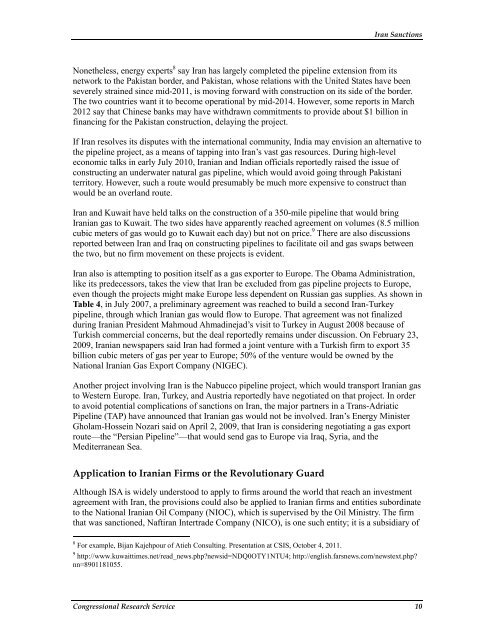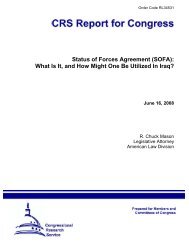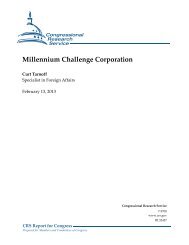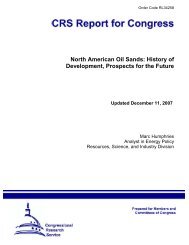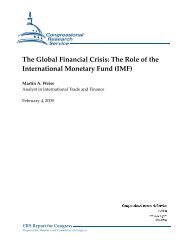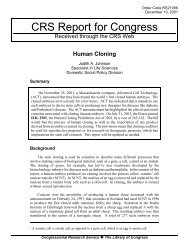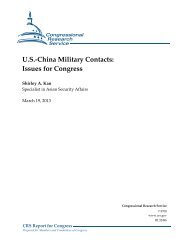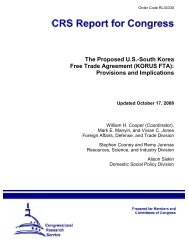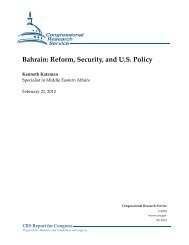Iran Sanctions - Foreign Press Centers
Iran Sanctions - Foreign Press Centers
Iran Sanctions - Foreign Press Centers
Create successful ePaper yourself
Turn your PDF publications into a flip-book with our unique Google optimized e-Paper software.
<strong>Iran</strong> <strong>Sanctions</strong><br />
Nonetheless, energy experts 8 say <strong>Iran</strong> has largely completed the pipeline extension from its<br />
network to the Pakistan border, and Pakistan, whose relations with the United States have been<br />
severely strained since mid-2011, is moving forward with construction on its side of the border.<br />
The two countries want it to become operational by mid-2014. However, some reports in March<br />
2012 say that Chinese banks may have withdrawn commitments to provide about $1 billion in<br />
financing for the Pakistan construction, delaying the project.<br />
If <strong>Iran</strong> resolves its disputes with the international community, India may envision an alternative to<br />
the pipeline project, as a means of tapping into <strong>Iran</strong>’s vast gas resources. During high-level<br />
economic talks in early July 2010, <strong>Iran</strong>ian and Indian officials reportedly raised the issue of<br />
constructing an underwater natural gas pipeline, which would avoid going through Pakistani<br />
territory. However, such a route would presumably be much more expensive to construct than<br />
would be an overland route.<br />
<strong>Iran</strong> and Kuwait have held talks on the construction of a 350-mile pipeline that would bring<br />
<strong>Iran</strong>ian gas to Kuwait. The two sides have apparently reached agreement on volumes (8.5 million<br />
cubic meters of gas would go to Kuwait each day) but not on price. 9 There are also discussions<br />
reported between <strong>Iran</strong> and Iraq on constructing pipelines to facilitate oil and gas swaps between<br />
the two, but no firm movement on these projects is evident.<br />
<strong>Iran</strong> also is attempting to position itself as a gas exporter to Europe. The Obama Administration,<br />
like its predecessors, takes the view that <strong>Iran</strong> be excluded from gas pipeline projects to Europe,<br />
even though the projects might make Europe less dependent on Russian gas supplies. As shown in<br />
Table 4, in July 2007, a preliminary agreement was reached to build a second <strong>Iran</strong>-Turkey<br />
pipeline, through which <strong>Iran</strong>ian gas would flow to Europe. That agreement was not finalized<br />
during <strong>Iran</strong>ian President Mahmoud Ahmadinejad’s visit to Turkey in August 2008 because of<br />
Turkish commercial concerns, but the deal reportedly remains under discussion. On February 23,<br />
2009, <strong>Iran</strong>ian newspapers said <strong>Iran</strong> had formed a joint venture with a Turkish firm to export 35<br />
billion cubic meters of gas per year to Europe; 50% of the venture would be owned by the<br />
National <strong>Iran</strong>ian Gas Export Company (NIGEC).<br />
Another project involving <strong>Iran</strong> is the Nabucco pipeline project, which would transport <strong>Iran</strong>ian gas<br />
to Western Europe. <strong>Iran</strong>, Turkey, and Austria reportedly have negotiated on that project. In order<br />
to avoid potential complications of sanctions on <strong>Iran</strong>, the major partners in a Trans-Adriatic<br />
Pipeline (TAP) have announced that <strong>Iran</strong>ian gas would not be involved. <strong>Iran</strong>’s Energy Minister<br />
Gholam-Hossein Nozari said on April 2, 2009, that <strong>Iran</strong> is considering negotiating a gas export<br />
route—the “Persian Pipeline”—that would send gas to Europe via Iraq, Syria, and the<br />
Mediterranean Sea.<br />
Application to <strong>Iran</strong>ian Firms or the Revolutionary Guard<br />
Although ISA is widely understood to apply to firms around the world that reach an investment<br />
agreement with <strong>Iran</strong>, the provisions could also be applied to <strong>Iran</strong>ian firms and entities subordinate<br />
to the National <strong>Iran</strong>ian Oil Company (NIOC), which is supervised by the Oil Ministry. The firm<br />
that was sanctioned, Naftiran Intertrade Company (NICO), is one such entity; it is a subsidiary of<br />
8<br />
For example, Bijan Kajehpour of Atieh Consulting. Presentation at CSIS, October 4, 2011.<br />
9<br />
http://www.kuwaittimes.net/read_news.php?newsid=NDQ0OTY1NTU4; http://english.farsnews.com/newstext.php?<br />
nn=8901181055.<br />
Congressional Research Service 10


